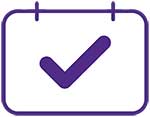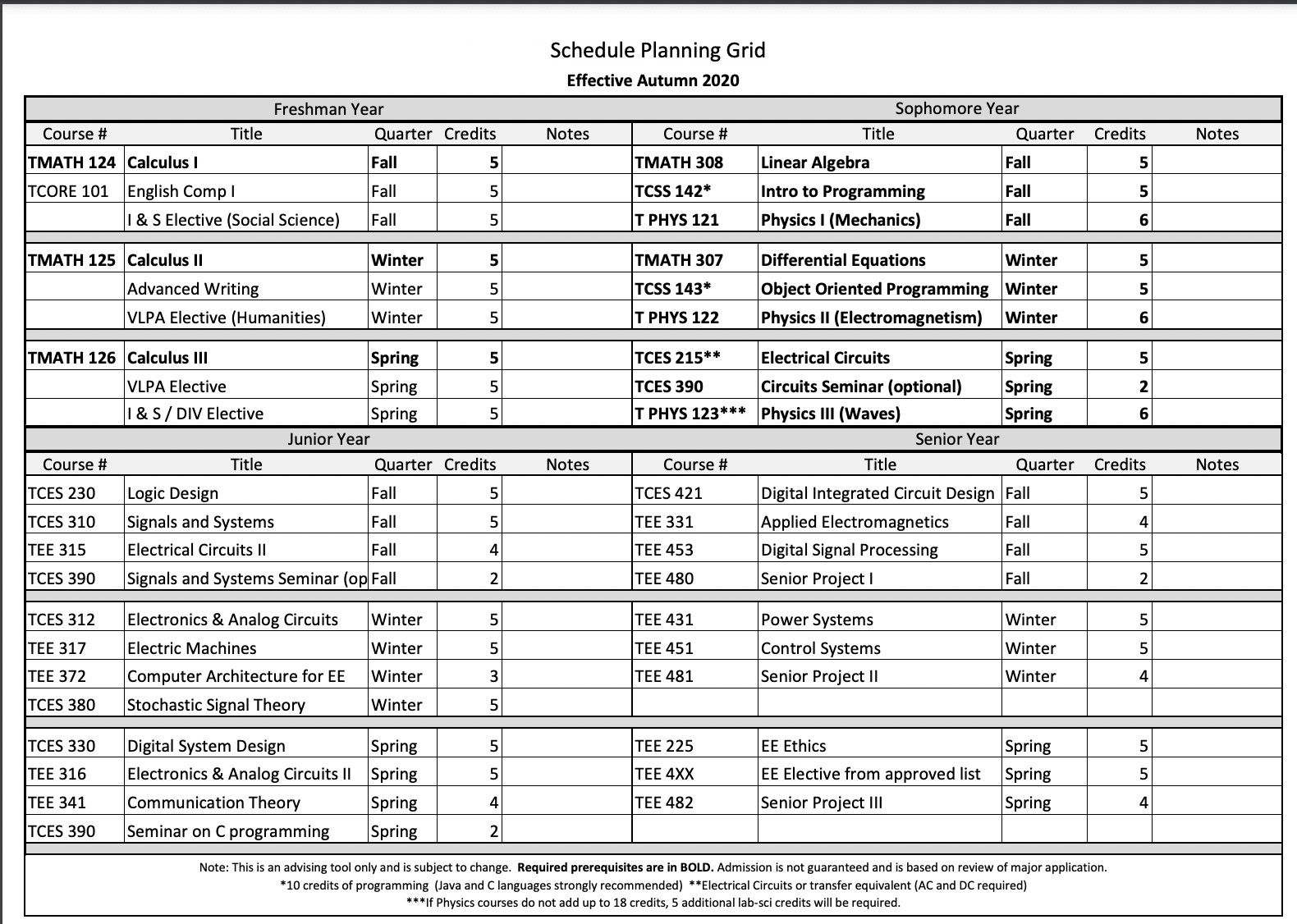Main Content
A few sentences introducing the program written as if spoken directly to a student in an advising office. General info about plan of study and how it's different from other SET programs. Students in the major participate in a rigorous and collaborative program tuned to regional industry needs.
Who should apply
- Prospective first-year students
- Prospective transfer students
- UWT students interested in changing majors from another SET or mathematics program
What our graduates do
General paragraph about prospects.
- this job
- that field
- graduate work
How to apply

|
Priority application deadline: July 1. The application may close at any time after the priority deadline once the program reaches capacity. |
If this is the same for every program, consider taking it out of the tabs bank and provide a prominent link elsewhere on the page. Less repetition is better for web content management. Having the info right here is better for users.
| Not yet admitted to UWT | You must be admitted to UWT and have a UW student ID number in order to submit your CES application. Apply for admission to UW Tacoma well before the program application deadline. |
| UWT admitted student | Submit the program application following the deadlines and process outlined on the application website. |
| Transfer students | Pursue the Associate in Science - Transfer Track 2 (WHERE IS THE INFO ABOUT THIS?) to meet the admission requirements. Use the UW Course Equivalency Guide to determine the equivalent prerequisites at your school. |
Selection criteria
Strong applicants typically have grades of 3.0 and higher in prerequisite math, science, engineering and programming courses, as well as a solid cumulative GPA.
Your application is evaluated on the following criteria:
- Completion of all prerequisite courses
- Grades in prerequisite courses -- individually and cumulatively (competitive applicants will have earned at least a 2.5 in each prerequisite course)
- Overall previous academic performance
- Completion of at least 45 college-level credits
Students in the program develop critical knowledge of ...
The program admits qualified students for autumn quarter only. The application typically opens in late winter/early spring. (CAN WE STANDARDIZE THIS INFO AND BE MORE SPECIFIC ABOUT APPLICATION OPEN TIMING?)
When planning your academic path, we encourage you to use our XYZ degree planning grid (NOT SURE IF I CAN LINK TO A PARTICULAR TAB).
Admission to the major is competitive. Please review the following prerequisites and application process carefully.
Prerequisites
Copy correct prerequisites for each program in here.
Students may be conditionally admitted into the program with certain prerequisites in progress, but all prerequisites must be completed in order to enroll.
To qualify for admission to the program, applicants must first be admitted to UWT and be on track to complete the following by the end of summer quarter before starting the major:
- Calculus I (TMATH 124), Calculus II (TMATH 125), Calculus III (TMATH 126)
- Differential Equations (TMATH 207)
- Matrix/Linear Algebra (TMATH 208)
- Physics I (TPHYS 121), Physics II (TPHYS 122), Physics III (TPHYS 123)
-
If the physics series is completed at UW Tacoma, no additional lab science is required.
- Electrical Circuits (TCES 215 - must have AC/DC)
- 10 credits of computer programming coursework (Java and C languages strongly recommended)
GPA requirements
- Required cumulative prerequisite GPA of at least 2.5, with a minimum grade of 2.0 in each individual prerequisite course.
- Required minimum cumulative GPA of 2.0 in all college coursework.
Before starting the application, make sure you're ready to apply:
-
You've been admitted to UW Tacoma and met the requirements to apply to the major (previous tab).
-
You have completed at least 45 college-level credits.
-
You completed the program's prerequisite courses listed in the Admission Requirements tab.
-
You've earned a minimum grade of 2.0 in each prerequisite course and maintain a minimum cumulative prerequisite GPA of 2.5.
-
You're meeting the July 1 priority application deadline. The application may close at any time after the priority deadline once the program reaches capacity.
Please note that the program application does not require a personal statement at this time. Letters of recommendation are not accepted.
Notes for transfer students:
- You may need one additional approved lab-based science course (Chemistry I -TCHEM 142 or Biology I - TBIOL 120) to meet the total number of lab science credits required (18 minimum) for graduation.
- UW Seattle and UW Bothell students seeking to transfer to UW Tacoma also need to have a transfer application on file to be considered for admission.
- If you are not admitted to UWT, you cannot be admitted to the CES/EE major, but you may hold off on accepting your offer of admission to UWT until you have your program admissions decision.
- Transfer students at Washington State community colleges are encouraged to pursue the Associate in Science - Transfer Track 2 (link?) to meet the admission requirements. Use the UW Course Equivalency Guide to determine the equivalent prerequisites at your school.
What to do with these links?
Curriculum
A lot of text here
Any interest in converting the planning grids to html for accessibility? It does require someone doing the updates on the website, so may be impractical.
The schedule planning grid shows a sample pathway to complete the program degree. Work with your advisor (link) to make sure you are completing required courses for the program and electives for your area of interest.
Download the program schedule planning grid (PDF) (link)

text, lists
Would this be different for the different programs? If not, try to create as reusable content on all undergrad program pages.
ABET Accreditation

The mission of the Electrical Engineering Program is to provide students with the fundamental knowledge and skills needed to be responsible and productive engineers who can improve the quality of life in the community and become leaders in the field.
Program educational objectives, as defined by ABET are the abilities, skills, and accomplishments expected of graduates within a few years of graduation. The Program Educational Objectives of the Electrical Engineering program are as follows:
Within three to five years of graduation from the EE program, it is expected that many graduates will have:
- Developed a complex product or process by applying their knowledge of engineering principles, science, mathematics, design and implementation.
- Participated effectively as a member of a multi-disciplinary team.
- Undertaken a leadership role applying communication skills to effectively promote their ideas, goals, or products.
- Made decisions related to their work that demonstrate an understanding of the importance of being an ethical engineering professional.
- Improved their skills and abilities by taking graduate courses, professional development training, or voluntary experiential learning opportunities.
- Made positive contributions to their community and society by applying skills and abilities learned during their undergraduate program in electrical engineering.
Since the objectives are fairly broad, it is not expected that every graduate will achieve every objective.
The Accreditation Board for Engineering and Technology (ABET) is a non-governmental organization that accredits post-secondary education programs in applied science, computing, engineering, and engineering technology. Students who complete the BSEE program will achieve the following ABET-based student outcomes:
- An ability to identify, formulate, and solve complex engineering problems by applying principles of engineering, science, and mathematics.
- An ability to apply engineering design to produce solutions that meet specified needs with consideration of public health, safety, and welfare, as well as global, cultural, social, environmental, and economic factors.
- An ability to communicate effectively with a range of audiences.
- An ability to recognize ethical and professional responsibilities in engineering situations and make informed judgments, which must consider the impact of engineering solutions in global, economic, environmental, and societal contexts.
- An ability to function effectively on a team whose members together provide leadership, create a collaborative and inclusive environment, establish goals, plan tasks, and meet objectives.
- An ability to develop and conduct appropriate experimentation, analyze and interpret data, and use engineering judgment to draw conclusions.
- An ability to acquire and apply new knowledge as needed, using appropriate learning strategies.
| Year | Enrollment | Degrees Awarded |
|---|---|---|
| 2020-2021 | 34 | - |
| 2019-2020 | 44 | 24 |
| 2018-2019 | 27 | 21 |
| 2017-2018 | 27 | n/a |
External Advisory Board
This could be on a separate page or in a third column next to ABET info. But until we get secondary (left side) navigation for sub-pages, maintenance of other links is onerous.
First Last
Title
First Last
Title
First Last
Title
First Last
Title
